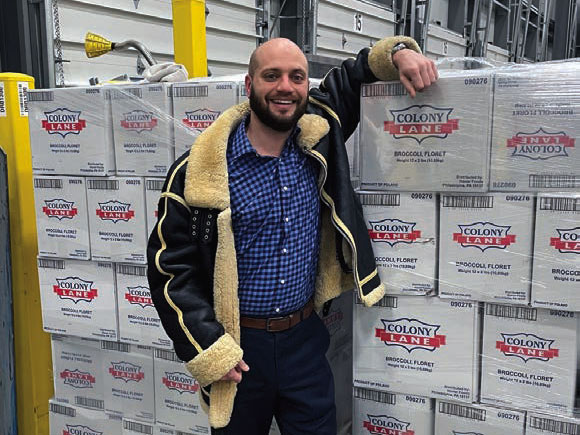As vice president of global procurement for TransGlobal Foods Inc., Christopher Dillon is sold on the “can-do” approach of the Port of Philadelphia, making him an ideal ambassador for PhilaPort in his dual roles as president of the World Trade Association of Philadelphia and its Ship Philly First initiative.
Indeed, Dillon firmly believes PhilaPort to be integral to the growth of TransGlobal Foods, which is based in Perkasie in suburban Bucks County. The company specializes in importing frozen fruits, vegetables, and french fries from a diverse supplier base spanning Latin America, Europe, Asia, and Africa.

“Where there’s chaos, there’s an opportunity, and we have definitely found the opportunity during this time,” Christopher Dillon said, citing 40 percent growth in TransGlobal’s business over the past two years since the COVID-19 pandemic first struck.
In early 2020, TransGlobal leadership, recognizing restaurants were closing and catering was coming to a halt but people obviously would continue to eat, shifted its business model and began selling directly to grocery stores while loading up on volumes before ocean freight rates totally skyrocketed. Once restaurateurs and caterers resumed operations, the company was well-positioned to pivot back to serving those sectors.
The company’s recent growth extends a success trend that, according to the younger Dillon, is significantly attributable to Philadelphia’s seaport. TransGlobal, which a decade and a half ago were annually bringing between 10 and 20 refrigerated containers into the Port of Philadelphia, is now importing more than 300 such reefer boxes a year into PhilaPort.
“A large part of that has to do with the Port of Philadelphia having the same kind of logic as TransGlobal Foods, which is that there’s always away, there’s always a solution to a problem, you’ve just got to figure it out,” Dillon said. “Like us, they don’t believe in the word ‘can’t.’
“We all realize the success of the Port of Philadelphia brings us success,” he said. “That’s why I’m successful, and that’s why the Port of Philadelphia is continuing to grow. And, as it grows, they haven’t lost that. They still have that personal touch, and I really mean this, the freight forwarders, truckers, everyone in Philadelphia really stick together. They don’t want to hear excuses, they want to be good.”
For example, at a time when many supply chain entities have enacted big price increases, PhilaPort has maintained fair pricing, said Dillon, who assumed the World Trade Association of Philadelphia and Ship Philly First positions in October.
“At the end of the day, the customer is going to remember the guy who didn’t take him for his shirt and his pants,” he said.
PhilaPort’s team serves in a facilitative role, Dillon said, commenting, “If you need something, they find someone who can help you get what you need, whether it’s warehouse space or a trucker.
“It’s what they can do for you – that’s what the Port of Philadelphia is so good at,” he added. “They want to know what their customers need help on.”
Currently, Ship Philly First is working with PhilaPort in efforts to bolster rail services through the port; to fortify yard installations to support higher stacking of containers, and to attract direct ocean carrier service from Asia.
“Honestly, the Port of Philadelphia is probably at least 30 percent of TransGlobal’s success,” Dillon said. “The growth of the port – and the relationships we have – has just really gotten us there.”



_-_127500_-_3c040b6cb8335b4cad39477f7f55a34202568c96_lqip.png)
